
Foreward
HAPPY NEW YEAR and may your 2011 be better than the last year, maybe even the best year yet. A new year brings its own challenges, some new, most a repeat of the old challenges. One constant challenge is finding sponsorship for our research efforts. If repeat sponsorship is a measure of satisfaction with the research output of GRI, I am proud to state that all the current single client sponsors have been doing business with us for many years.
Without tremendous pressure to contain costs, the purchasing departments of many gear manufacturing entities, are buying cheaper steel from China and other non-traditional sources. Whether this steel meets the quality required for failure-free operation is significant. Metallurgical analysis alone may be insufficient to confirm the quality of the purchased steel. We at GRI have been working with several sponsors to devise and establish gear fatigue tests to verify the quality in an accelerated fashion. If there is an opportunity to assist you in doing the same, please contact us.
Suren Rao
Managing Director
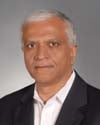
Research Projects
Gear Fatigue Testing at Elevated Temperature
The Gear Research Institute, on behalf of its Aerospace Bloc, is characterizing the fatigue properties of gear steel at 400°F. This article briefly discusses the challenges encountered and solutions implemented to accomplish the objective of this project.
But first, a clarification on the nomenclature is in order. In fatigue characterization at elevated temperature we are dealing with three distinct temperatures in three distinct zones of the gear tooth. They are the contact temperature on the surface at the tooth mesh, the bulk temperature within the gear material just below the contact surface and the overall blank temperature. This is illustrated in Figure 1. This distinction was established to correlate these temperature zones to the three most frequently encountered modes of gear failure. The contact temperature zone is related to scoring, the bulk temperature zone affects contact fatigue and the blank temperature zone is related to bending fatigue. In this project it was proposed to conduct power re-circulating Rotating Bending Fatigue (RBF) tests and power re-circulating Contact Fatigue (CF) tests at 400°F. It had been established in an earlier study that the bulk and blank temperature on the gear can be controlled by controlling the lubricating oil inlet temperature(1).
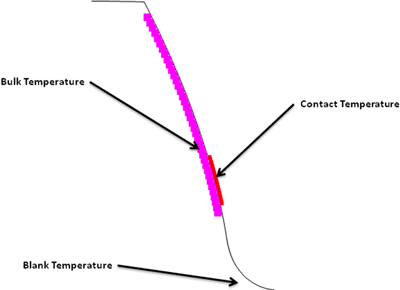
Figure 1. Nomenclature
Since there was concern whether a blank temperature of 400°F could be generated at the low rotational speeds that RBF tests are conducted at (<2500 rpm), Single Tooth Bending Fatigue (STBF) tests were also included, as a fall-back. As shown in Figure 2, STBF tests are easily conducted by mounting the test fixture, shown on the left hand side, within a tank containing a fluid (marquenching oil in this instance), as shown on the right hand side, heated to the required temperature of 400°F.
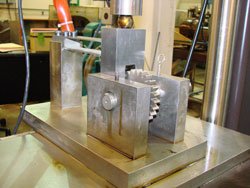
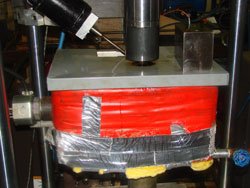
Figure 2. Hot STBF Testing
Hot RBF Test: A test gear instrumented with thermocouples to measure blank and bulk temperatures, shown in the left hand side of Figure 3, was mounted in a power re-circulating 4-square test rig, as shown in the right hand side. As the test rig was operating under a test load, utilizing synthetic gear oil, the oil inlet temperature was slowly ramped up and the thermocouples monitored to establish the blank and bulk temperatures to verify the feasibility of obtaining blank temperatures of 400°F.
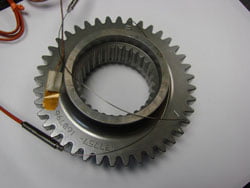
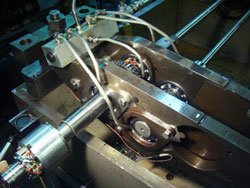
Figure 3: Hot RBF Testing
The test proceeded normally and as the oil inlet temperature was increased the blank and bulk temperature increased. At an oil inlet temperature of 375°F and a blank temperature of 394°F scoring occurred. Fortunately, this failure occurred on the non-instrumented reversing gear pair and not on the instrumented gear pair.
When presented with this situation, the sponsors insisted that steps be taken to ensure RBF tests are conducted at a blank temperature of 400°F. Two options were proposed. Consider scoring additives to the lubricant and/or reduce test speed. Both these alternatives were evaluated and a blank temperature of 400°F was achieved without scoring. While similar issues were encountered and resolved in power re-circulating Contact Fatigue tests, a description on this topic will be featured in a future newsletter.
1 S. B. Rao and D. R. McPherson, “Gear Tooth Temperature Measurements”, GEAR Solutions, vol. 7 No. 77, August 2009.
Education and Training
In order to assist the gear industry augment its aging work force, the Gear Research Institute has proposed two initiatives to train more gear knowledgeable engineers at the undergraduate and graduate levels. This involves incorporating engineering undergraduate students at the junior/senior level and graduate students in the Institute’s research efforts while being paid by a grant from the sponsoring industrial entity. Summer internships at the sponsor’s facility are also a part of the deal so that the student and the sponsor have an opportunity to assess each other with future employment in mind. For more details please contact Dr. Suren Rao at 814 865 3537 or sbr1@psu.edu.
The Gear Research Institute is a non profit corporation. It has contracted with the Applied Research Laboratory of The Pennsylvania State University to conduct its activities, as a sponsor within the Drivetrain Technology Center. The Gear Research Institute is equipped with extensive research capabilities. These include rolling contact fatigue (RCF) testers for low- and high-temperature roller testing, power circulating (PC) gear testers for parallel axis gears with a 4-inch center distance (testers can be modified to accommodate other center distances), single tooth fatigue (STF) testers for spur and helical gears, gear tooth impact tester, and worm gear testers with 1.75 and 4-inch center distances. Extensive metallurgical characterization facilities are also available at Penn State in support of the Gear Research Institute. For further details on our testing capabilities please go to the Drivetrain Technology Center website or call Dr. Suren Rao, Managing Director, at (814) 865-3537.
